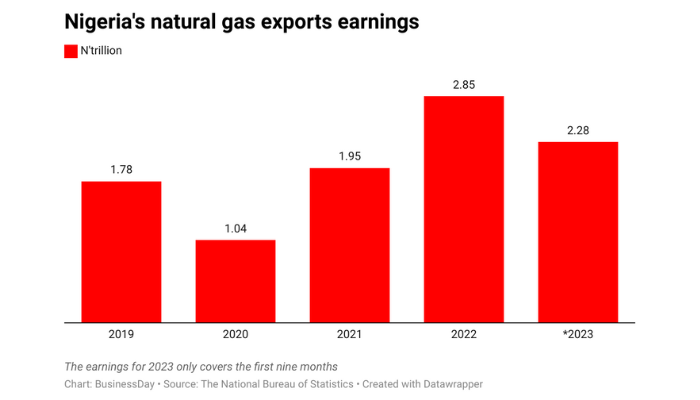Nigeria, Africa’s largest financial system, faces a looming four-year decline in Liquefied Pure Gasoline (LNG) exports, a brand new report seen by BusinessDay has proven.
In line with the Fragile Equilibrium: LNG Commerce Dynamics and Market Dangers Report by the Worldwide Vitality Discussion board and SynMax, Nigeria’s LNG exports are anticipated to fall on the again of declining home manufacturing and elevated home demand.
The report revealed that Nigeria, which sits sixth on the planet’s largest exporter of LNG from January to October 2023, has been recording a gradual decline in its commerce prior to now months.
Knowledge sourced from Statista revealed that the quantity of LNG exported from the nation has been declining since 2022 after reaching a file excessive a 12 months earlier than.
LNG exportation within the nation fell from 1.36 trillion cubic toes (tcf) in 2021 to 1.14 tcf in 2022, indicating a 16 p.c decline on account of a lower in home manufacturing alongside an upswing in home demand.
Knowledge gleaned from the Nationwide Bureau of Statistics (NBS) confirmed that Nigeria earned N2.85 trillion from the exportation of LNG in 2022 and has earned N2.28 trillion within the first 9 months of 2023.
BusinessDay’s evaluation revealed that this improvement hinged on the again of the Russia-Ukraine tussle which began in February 2022, thereby taking the market value of pure fuel to an all-time excessive of $6.29 per Metric Million British Thermal Unit (mmBtu) or 1000 cubic toes. Nevertheless, Pure Gasoline costs stood at $2.54 per mmBtu late Saturday, December 30, 2023, based on Oilprice.
Olufola Wusu, Companion and Head of Oil and Gasoline at Megathos Regulation Follow stated steady assaults on oil and fuel amenities, escalating manufacturing prices, the demand for superior drilling know-how, and group points have diminished related fuel provide for LNG corporations.
“Different components embrace the shift to deep offshore fields by Worldwide Oil Firms (IOCs), subject maturity inflicting output decline, reluctance to drill new wells, and preliminary delays in establishing a bid course of for brand new oil and fuel blocks.”
Wusu additionally highlighted the influence of delayed drilling for non-associated fuel within the prolific deep offshore fields on the decline in pure fuel gross sales.
In March 2021, former President Muhammadu Buhari proclaimed the 2020s as Nigeria’s ‘decade of fuel,’ signalling a deliberate shift within the authorities’s focus in direction of utilising fuel as the first gas to propel the nation’s industrial ambitions.
Regardless of boasting the world’s tenth-largest fuel reserves, totalling roughly 208 tcf, as reported by the Nigerian Nationwide Petroleum Firm (NNPC) restricted, the nation’s precise fuel manufacturing in 2021 amounted to 1.62 tcf—falling behind each Algeria (3.56 tcf) and Egypt (2.4 tcf), regardless of Nigeria possessing bigger reserves.
The prevailing state of affairs highlights a disparity between Nigeria’s appreciable fuel potential and its present manufacturing output. Nearly all of the fuel is derived as a byproduct of oil exploration, categorised as related fuel, and a considerable portion of this produced fuel is directed in direction of exports.


